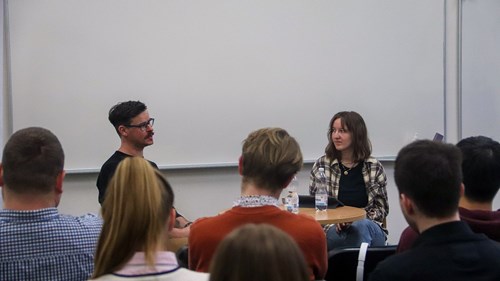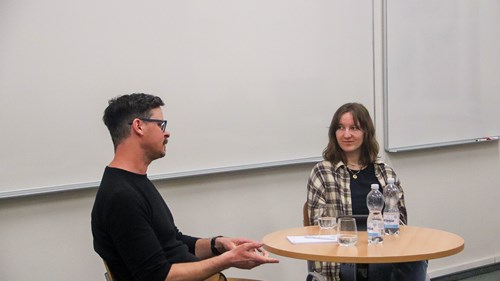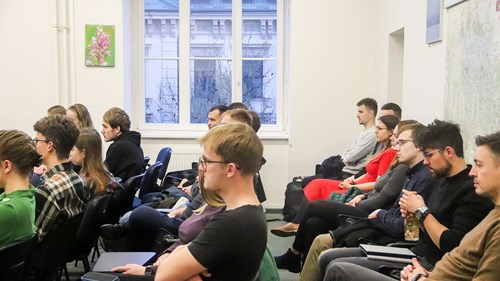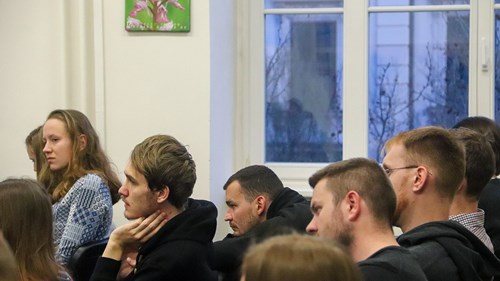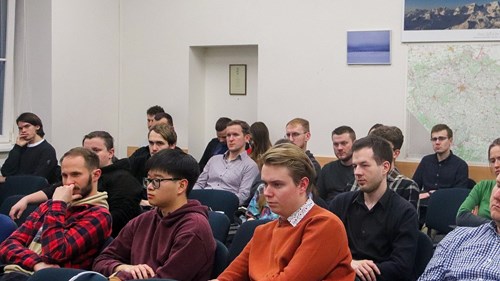* * SCROLL BELLOW FOR ENGLISH VERSION * *
Na začátku debaty byla zhodnocena kyberbezpečnost v České republice. I přes to, že Rojčík již dva roky působí mimo státní sféru a do některých věcí nemá tak detailní vhled, odpověděl, že situace v Česku není špatná. Od kyber útoků na nemocnice, které proběhly v minulosti, nebyly zaznamenány nějaké větší útoky na kritickou infrastrukturu státu. Je to způsobeno tím, že politická reprezentace a státní sektor poměrně rychle zjistily, že kyberprostor je velké téma, bez kterého se bezpečnost neobejde. Proto se postupně začalo investovat do této oblasti jak finančně, tak i v dalších ohledech, nové zákony, instituce, infrastruktura atd. Česká republika v tomto ohledu předběhla i dění v EU.
Dále jsme probírali původce útoků, zda se jedná o státní nebo nestátní aktéry a kteří z nich jsou největší hrozbou pro naši bezpečnost. V ČR je největším problémem organizovaný zločin, kdy jsou pachatelé motivovaní převážně finančním ziskem. V některých případech mohou být útoky částečně propojeny s politickým motivem. Poté se jedná především o útoky outsourcované od jiného státu. Útoky vedené přímo státem jsou v řádu jednotek. Odhalit pachatele však není největší prioritou. Jde především o prevenci, zde je důležité se poučit a zajistit protiopatření. Atribuce pachatele je důležitá pouze v případech dlouhodobé kampaně nebo pokud došlo k trestnému činu.
Pan Rojčík nám také sdělil nejdůležitější vlastnosti, které by měl správný analytik mít, a také jaké jsou výhody a nevýhody práce ve státní správě a v soukromém sektoru. Dále jsme se bavili o spolupráci, která mezi sektory probíhá, bez níž by další rozvoj nebyl možný. Jedná se například o spolupráci na zákonech, které byly tvořeny společně s akademickou veřejností, nebo implementaci jednotlivých opatření a jejich zavedení do praxe. Stát představí, jaký by měl být výsledek a zavedení jednotlivých mechanismů nechává na samotných subjektech. Také byla zmíněna mezinárodní spolupráce, která je dána prostředím, ve kterém se pohybujeme (EU, NATO). Rojčík srovnával mimo jiné vztahy mezi zpravodajskými službami, které mezi sebou měly již vybudované určité konexe, oproti NÚKIB, kde se veškeré kontakty musely stavět od základů. V počátcích, kdy se NÚKIB rozvíjel, se stávalo, že o pomoc žádaly i jiné státy. V této době jsou již vztahy rozvinutější a je považován za respektovaného partnera.
Před otázkami z publika byla řeč o technologiích a využití AI při práci analytika. Dle Rojčíka jsme teprve na začátku něčeho velkého, co je ale prozatím daleko. Na toto prostředí se připravují jak analytici, tak útočníci. Všichni chtějí tyto nástroje adaptovat do procesu. On sám je rád využívá například při zpětných kontrolách. Je ovšem nutné trénovat jazykové modely, do kterých se zatím nejsme schopni podívat, zda jsou nebo nejsou škodlivé. Umíme s nimi ale určitým způsobem pracovat. Zatím se hledají cesty, procesy a doporučení. V budoucnu bude nejdůležitějším tématem právě AI. Dalším trendem budou kvantové počítače, především problém kvantově odolného šifrování. Tomu se věnuje také soukromý sektor, který v této oblasti dělá pokroky.
Děkujeme panu Rojčíkovi za přijetí pozvání a publiku za hojnou účast a zajímavé dotazy do diskuze.
Budeme se těšit na dalších akcích!
* * ENGLISH VERSION * *
Round Table - Ondřej Rojčík: "Cybersecurity of the Czech Republic"
On the second round table of the semester, we welcomed the invitation of analyst Ondřej Rojčík. After studying at the Faculty of Social Studies of Masaryk University, he worked as a threat analyst in the field of cyberspace both in the public sector, intelligence services, and at NÚKIB (National Cyber and Information Security Agency), as well as in the private sector, where he now works at the IT company Red Hat.
At the start of the discussion, the state of cybersecurity in the Czech Republic was assessed. Despite Rojčík's two-year tenure outside the public domain and a limited grasp of certain aspects, he asserted that the situation in the Czech Republic is satisfactory. Since the cyber attacks on hospitals in the past, no major attacks on the critical infrastructure of the state have been recorded. This is because the political representation and the public sector quickly realized that cyberspace is a significant issue without which security cannot be maintained. Therefore, investments have gradually been made in this area both financially and in other respects, including new laws, institutions, infrastructure, etc. In this regard, the Czech Republic has surpassed developments in the EU.
We also discussed the perpetrators of attacks, whether they are state or non-state actors, and which of them pose the greatest threat to our security. In the Czech Republic, organized crime is the biggest problem, with perpetrators mainly motivated by financial gain. In some cases, attacks may be partially linked to political motives. Then, attacks mainly come from outsourcing by another state. State-led attacks are in the order of units. However, identifying the perpetrators is not the top priority. Prevention is the main focus, where learning and ensuring countermeasures are crucial. Attribution of the perpetrator is only important in cases of a long-term campaign or if a crime has been committed.
Mr. Rojčík also shared the most important qualities that a proper analyst should have, as well as the advantages and disadvantages of working in the public administration and the private sector. We also discussed the collaboration between sectors, without which further development would not be possible. This includes collaboration on laws that have been developed jointly with the academic community or the implementation of individual measures and their practical application. The state presents what the outcome should be, leaving the implementation of individual mechanisms to the entities themselves. International cooperation was also mentioned, which is driven by the environment in which we operate (EU, NATO). Rojčík compared, among other things, the relationships between intelligence services, which already had certain connections established, to NÚKIB, where all contacts had to be built from scratch. In the early stages of NÚKIB development, other countries also sought assistance. At this time, relationships are more developed, and it is considered a respected partner.
Before questions from the audience, there was a discussion about technologies and the use of AI in the work of an analyst. According to Rojčík, we are only at the beginning of something significant, but it is still far away. Both analysts and attackers are preparing for this environment. Everyone wants to adapt these tools to the process. He himself enjoys using them, for example, in retrospective checks. However, it is necessary to train language models, which we are not yet able to determine whether they are harmful or not. But we can work with them in a certain way. Paths, processes, and recommendations are still being sought. In the future, AI will be the most important topic. Another trend will be quantum computers, especially the problem of quantum-resistant encryption. The private sector is also focusing on this area and making progress.
We thank Mr. Rojčík for accepting the invitation and the audience for their active participation and interesting questions in the discussion.
We look forward to future events!
Foto: Barbora Zimová


